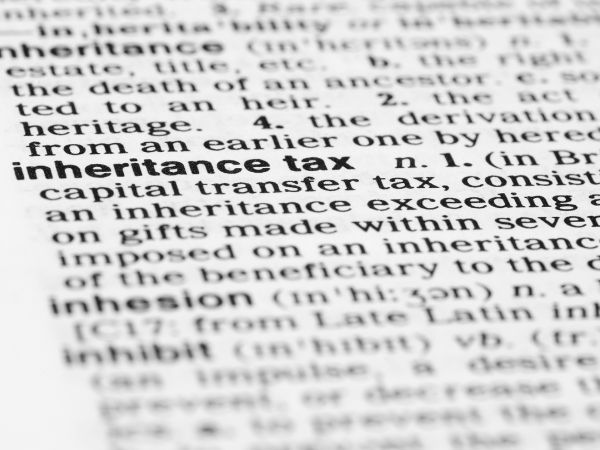Does Making a Will Help With Inheritance Tax?
Inheritance tax is a significant concern for individuals who wish to pass on their wealth to future generations. Understanding inheritance tax is crucial for individuals seeking to minimise their tax liability and ensure a smooth transfer of someone's estate to their beneficiaries.
What is Inheritance Tax?

Inheritance tax is a levy imposed on someone’s estate, which includes all their assets, properties, and possessions. The amount of tax payable depends on the net value of the estate and the relationship between the deceased and the beneficiaries. In many countries, including the United Kingdom and the United States, inheritance tax is a significant consideration in estate planning. Obtaining a grant of probate through a probate service is often necessary to manage and distribute someone's estate.
Purpose of Inheritance Tax
Inheritance tax is designed to generate revenue for the government by taxing the wealth transferred from one generation to another. The tax rate and thresholds vary from country to country.
Inheritance Tax in the United Kingdom
In the United Kingdom, inheritance tax is currently set at 40% for estates valued above the nil-rate band, which is the threshold value below which no inheritance tax is due. Understanding the tax thresholds and exemptions is crucial for individuals who wish to plan their estate efficiently and minimise their tax liability.
Importance of Legal Counsel
In cases where there are several family members, such as children from a first marriage or a second spouse, it is advisable to seek legal counsel to navigate potential claims on the estate.
The Role of a Will in Inheritance Tax Planning
Making a Will is an essential component of responsible inheritance tax planning, ensuring the proper distribution of someone's estate. A Will is a legal document that specifies how a person’s assets should be distributed after their death. By making a Will, individuals can ensure that their assets are distributed according to their wishes, while also taking advantage of any available tax exemptions and reliefs.
Tax Exemptions and Reliefs
In some countries, there are exemptions for assets left to a spouse or civil partner, charitable donations, and certain types of businesses or agricultural properties. A well-drafted Will can help individuals take advantage of inheritance tax reliefs and allowances.
In the United Kingdom, the introduction of the residence nil-rate band allows individuals to pass on their main residence to direct descendants tax-free, up to a certain value. By including such provisions in their Will, individuals can maximise the value of their estate that can be passed on without incurring inheritance tax.
The Role of a Will in Estate Planning
Making a Will is a fundamental aspect of estate planning, allowing individuals to dictate how someone's estate should be distributed after their death. While a Will itself does not directly impact the amount of inheritance tax payable, it can play a crucial role in mitigating the overall tax burden.
Potential Benefits of Making a Will
By carefully structuring the estate, utilising tax reliefs and exemptions, and seeking professional advice, individuals can potentially reduce the inheritance tax liability on their assets. A well-structured Will can:
- Ensure assets are distributed according to the individual's wishes
- Utilise available tax reliefs and exemptions
- Provide clarity and avoid disputes among beneficiaries
Limitations of a Will in Relation to Inheritance Tax
It is important to note that the effectiveness of a Will in relation to inheritance tax depends on various factors, such as:
- The value of the estate
- The nature of the assets
- Existing tax legislation
By delving into the intricacies of inheritance tax and the role of a Will solicitor in estate planning, individuals can gain a clearer understanding of how they can minimise the tax liabilities on their assets. Seeking professional advice and carefully planning the estate can help reduce the inheritance tax burden, ensuring more wealth is passed on to future generations.
Utilising Tax Reliefs and Exemptions
Utilising various tax reliefs and exemptions can significantly mitigate the impact of inheritance tax. By taking advantage of these provisions, individuals can effectively reduce their tax liability and ensure that more of their assets are passed on to their beneficiaries.
For high-value estates, the application of reliefs such as the residence nil-rate band can be particularly complex, especially when the whole estate itself's value exceeds certain thresholds.
Key Ways to Minimise Inheritance Tax
Business Property Relief (BPR)
This relief is available to individuals who own a business, house or shares in an unquoted company. BPR allows for a reduction in the value of these assets when calculating the inheritance tax due. The relief supports the continuity of family-owned businesses by preventing the need to sell assets to pay the tax bill. The percentage of relief depends on the length of ownership, with a potential maximum relief of 100% after holding the assets for two years.
Agricultural Property Relief (APR)
Similar to BPR, APR provides relief for agricultural land and property. It aims to protect the viability of agricultural businesses by reducing the value of these assets for inheritance tax purposes. The relief can be claimed on both the agricultural land itself and on farmhouses and buildings that are of a certain character and used for the purposes of agriculture. As with BPR, the percentage of relief depends on the length of ownership, with a potential maximum relief of 100% after holding the assets for two years.
Annual Exemptions and Gift Allowances
In addition to the above reliefs, individuals can also use annual exemptions and gift allowances to reduce their inheritance tax liability. Currently, each individual has an annual exemption of £3,000, meaning gifts up to this value can be made each year without being subject to inheritance tax. Furthermore, individuals can make small gifts of up to £250 to any number of individuals without affecting their tax liability. Gifts made more than seven years before death are exempt from inheritance tax.
By carefully considering and utilising these tax reliefs and exemptions, individuals can effectively reduce the impact of inheritance tax. However, it is important to seek professional advice to ensure that these provisions are applied correctly and in line with the relevant legislation.
Planning ahead and taking advantage of these opportunities can help individuals preserve their wealth for future generations and ensure that their wishes are fulfilled.
Structuring High-Value Estates for Tax Efficiency
Minimising the impact of inheritance tax can be effectively achieved by strategically structuring one’s estate with a focus on tax efficiency.
Carefully organising assets and liabilities allows individuals to employ various tax planning strategies, reducing the overall tax burden on their estate.
Use of Trusts
One significant aspect of estate structuring is the use of trusts, which help preserve family wealth and provide flexibility in managing and distributing assets.
Trusts are legal arrangements where individuals transfer ownership of their assets to a trustee, who manages these assets on behalf of the beneficiaries.
Placing assets in a trust ensures they are not subject to inheritance tax upon death, as assets in a trust are not considered part of the individual’s estate for tax purposes. Additionally, trusts offer asset protection, shielding assets from creditors and potential legal claims.
Lifetime Gifting
Another important strategy for tax-efficient estate structuring is lifetime gifting. By making gifts during their lifetime, individuals can reduce the value of their estate and lower potential inheritance tax liability.
Various gifting strategies include making regular annual gifts within the tax-free threshold and utilising the ‘seven-year rule.’ The seven-year rule allows gifts to be exempt from inheritance tax if the individual survives for at least seven years after making the gift.
Tax Reliefs and Exemptions
Structuring an estate for tax efficiency may also involve taking advantage of available tax reliefs and exemptions.
Business and Agricultural Property Relief
Certain business and agricultural assets may qualify for relief from inheritance tax, such as Business Property Relief and Agricultural Property Relief. These reliefs can significantly reduce the taxable value of the estate, allowing individuals to pass on assets without substantial tax liabilities. It is essential to seek professional advice when using these reliefs, as they often have specific conditions and requirements.
Strategically structuring an estate for tax efficiency can minimise the impact of inheritance tax. Utilising trusts, lifetime gifting, and taking advantage of tax reliefs and exemptions can reduce the overall tax burden. Professional advice is crucial in this process, as tax laws and regulations are complex and subject to change.
Maximising the Benefits of Will Writing Services
By strategically optimising the benefits of a well-drafted Will, individuals can safeguard their assets and distribute their estate in accordance with their wishes. This process is akin to a master key unlocking the doors to inherit a well-structured legacy.
Control and Distribution of Assets- A Will allows individuals to control how their property and assets are distributed after their demise, ensuring their loved ones are taken care of. It also enables them to leave money to both beneficiaries and charitable organisations.
- In cases of major life changes, such as remarriage or divorce, it is crucial to create a new Will to ensure that the distribution of assets aligns with current wishes. Additionally, a Will provides an opportunity to minimise the impact of inheritance tax, maximising the benefits for the beneficiaries.
- One key advantage of making a Will is the ability to plan and structure the distribution of assets in a tax-efficient manner. By carefully considering the tax implications of various asset distribution strategies, individuals can potentially reduce the overall inheritance tax liability.
- Allocating specific assets or funds to certain beneficiaries who may be subject to a lower tax bracket can reduce the tax burden on the estate. Furthermore, a Will can include provisions for utilising available tax reliefs and exemptions, such as the spouse exemption or the nil-rate band, to further help reduce the inheritance tax liability.
- Another benefit of making a Will is the opportunity to implement trusts as part of the estate planning process. Trusts can protect assets and provide for specific needs or circumstances. By establishing trusts within a Will, individuals can ensure that their assets are managed and distributed according to their wishes, while potentially reducing the inheritance tax liability.
- Trusts are particularly useful when there are concerns about the ability of beneficiaries to manage their inheritance or if there is a desire to provide for future generations while maintaining control over the assets.
- A well-drafted Will can also provide peace of mind by avoiding potential disputes and conflicts among family members. Clear and unambiguous instructions regarding the distribution of assets can help to prevent disagreements and legal battles, ensuring the estate is settled smoothly and in accordance with the individual’s wishes. This helps to preserve family relationships and minimise emotional stress during an already difficult time.
- While it is possible to make your own Will, seeking professional assistance is often advisable to avoid potential mistakes and ensure all legal requirements are met. Making a Will not only allows individuals to control the distribution of their assets but also provides opportunities to minimise the impact of inheritance tax.
- By carefully considering tax-efficient strategies, utilising trusts, wills and avoiding potential disputes, individuals can maximise the benefits of a Will and ensure their assets are distributed according to their wishes, while potentially reducing the tax burden on their estate.
Working with Professionals for Inheritance Tax Planning
Expertise and Guidance
- Collaborating with professionals experienced in estate planning and tax management can provide valuable guidance for efficient asset distribution and minimising tax liabilities. Inheritance tax planning is complex and requires expertise in tax laws and regulations.

Professionals such as tax advisors, estate planners, and lawyers help individuals navigate these intricacies and develop effective strategies to mitigate tax impact. They also assist with navigating probate services, ensuring the legal administration of the estate is handled efficiently.
In-Depth Understanding of Tax Laws
- One key advantage of working with professionals in inheritance tax planning is their in-depth understanding of tax laws and regulations. These experts are well-versed in complex and ever-changing tax codes and can provide insights on structuring an estate plan to minimise tax liabilities. They analyse financial situations, identify tax-saving opportunities, and recommend appropriate strategies to reduce inheritance tax impact. Utilising reputable Will writing services ensures the Will is drafted correctly and complies with legal standards.
Maximising Tax Reliefs and Exemptions
- Professionals help individuals maximise the use of tax reliefs and exemptions available for inheritance tax. These can significantly reduce the taxable value of an estate and lower the amount of inheritance tax payable. They identify and advise on eligibility criteria and application processes for various reliefs, such as the spouse exemption, charitable exemptions, and business property relief. Effectively leveraging these reliefs ensures assets are distributed according to the individual’s wishes while minimising the tax burden on beneficiaries.
Comprehensive Estate Planning
- Professionals assist in creating a comprehensive estate plan that addresses inheritance tax and considers asset protection and succession planning. They help structure assets to protect them from potential risks, such as creditors or legal disputes. Additionally, they advise on the most tax-efficient transfer of assets during an individual’s lifetime, ensuring a smooth transition of wealth to the next generation.
- Collaborating with professionals in estate planning and tax management is highly beneficial for inheritance tax planning. Their expertise in tax laws and regulations provides valuable guidance in developing strategies to minimise tax liabilities. By leveraging their insights, individuals can maximise tax reliefs and exemptions, create comprehensive estate plans, and ensure efficient asset distribution while minimising inheritance tax burdens.
Frequently Asked Questions
What is the current threshold for Inheritance Tax in my country?
The current threshold for inheritance tax varies by country. In the UK, for example, the threshold is £325,000. The threshold is subject to change and can be affected by factors such as marital status and property ownership. All the assets owned by an individual at the time of their death are typically included in the calculation of inheritance tax.
Can I reduce my Inheritance Tax liability by giving gifts to my civil partner during my lifetime?
Giving gifts during your lifetime can help reduce your inheritance tax liability. By utilising various gifting strategies, such as making regular small gifts or utilising exemptions and reliefs, individuals can decrease the amount of inheritance tax payable upon their death.
Are all assets included in the calculation of the net value for Inheritance Tax?
All assets owned by an individual at the time of their death are typically included in the calculation of inheritance tax. Exemptions are available for assets left to spouses and civil partners, which can significantly reduce the inheritance tax liability. This includes property, investments, savings, and possessions, subject to certain exemptions and thresholds.
Can I use my Will to specify how my assets should be distributed to minimise Inheritance Tax?
Specifying the distribution of assets in a will can potentially minimise inheritance tax. Entering into a civil partnership can also impact the distribution of assets and the application of inheritance tax exemptions. By strategically allocating assets to beneficiaries, individuals may reduce the overall taxable estate, mitigating the burden of inheritance tax.
Are there specific tax planning strategies to minimise Inheritance Tax?
There are several tax planning strategies that can be utilised to minimise inheritance tax. These strategies include lifetime gifting, setting up trusts, utilising exemptions and reliefs, and making use of tax-efficient investment vehicles.
Conclusion

Creating a Will can significantly aid in managing inheritance tax. By understanding inheritance tax intricacies and using tax reliefs and exemptions, individuals can structure their estates to maximise tax efficiency. For example, any unused portion of the nil rate band can be transferred to a surviving spouse or civil partner, potentially allowing for a larger tax-free estate.
A well-crafted Will enables individuals to outline their wishes and distribute assets in a manner that minimises the tax burden on beneficiaries. It is important to consider the implications of a registered civil partnership, as it can affect the application of inheritance tax exemptions and reliefs.
A Will provides the opportunity to structure an estate in a way that maximises tax benefits. By carefully considering the distribution of assets and utilising available reliefs, one can create a tax-efficient estate plan that protects loved ones from unnecessary tax burdens.
Making a Will is not just a legal formality but a strategic tool in managing inheritance tax. It empowers individuals to take control of their financial legacy and protect their hard-earned assets for future generations.

